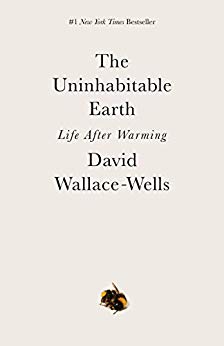 David Wallace-Wells, The Uninhabitable Earth: Life After Warming (New York: Tim Duggan Books, 2019), 310pp.
David Wallace-Wells, The Uninhabitable Earth: Life After Warming (New York: Tim Duggan Books, 2019), 310pp.
When my wife and I hiked across England last summer (the Wainwright Walk), we met a couple from Cape Town that described to us their catastrophic drought that led to draconian restrictions: the city's 4.5 million citizens were required to limit themselves to 23 gallons of water per day. In the United States, average consumption is easily five times that amount. And the day that I finished The Uninhabitable Earth, the proceedings of the National Academy of Sciences published a paper, based on fifty years of data, that documented how Greenland's ice is melting six times faster than it was in the 1980s.
The message of this book is both simple and terrifying: our climate change disaster is "worse, much worse, than you think." Already. Right now. Not a few decades from now, when things will almost certainly be worse still. In the year 2050, to take just one of the many dozens of examples that Wallace-Wells gives, the UN projects that there will be 200 million climate refugees, which is more than the population of the entire world during the peak of the Roman Empire.
There's no uncertainty about the science, says Wallace-Wells, only the uncertainty of our human choices and actions. And herein lies the proverbial silver lining. Despite the pessimistic conclusions that one might draw from his apocalyptic narrative, Wallace-Wells says that he is not fatalistic, and that we should never surrender or withdraw as if we were helpless. He rejects "climate nihilism." We have choices, and "there is nothing stopping us from steering clear" of environmental annihilation, except, perhaps, our "incredible failure of imagination" to grasp what is right in front of us.
But our individual actions must be "scaled" by robust politics. However good it feels to juice your Prius from your solar roof, consumer choices are no substitute for political action. Voting is more important than eating organic. Wallace-Wells's story of our "emergent form of suffering" is, he hopes, "horrifying. It is also, entirely, elective." Our crisis is "political and, therefore, functionally elective."
For more on this topic, see my reviews of the books: Rebecca E. Hirsch, Climate Migrants: On the Move in a Warming World (2017); Elizabeth Kolbert, The Sixth Extinction; An Unnatural History (2014); Bill McKibben, Eaarth; Making a Life on a Tough New Planet (2010); Robert Jay Lifton, The Climate Swerve: Reflections on Mind, Hope, and Survival (2017); and Jared Diamond, Collapse: How Societies Choose to Fail or Succeed (2005); and then the movie Climate Refugees (2009).
Dan Clendenin: dan@journeywithjesus.net


